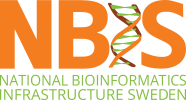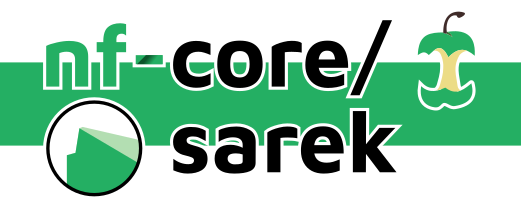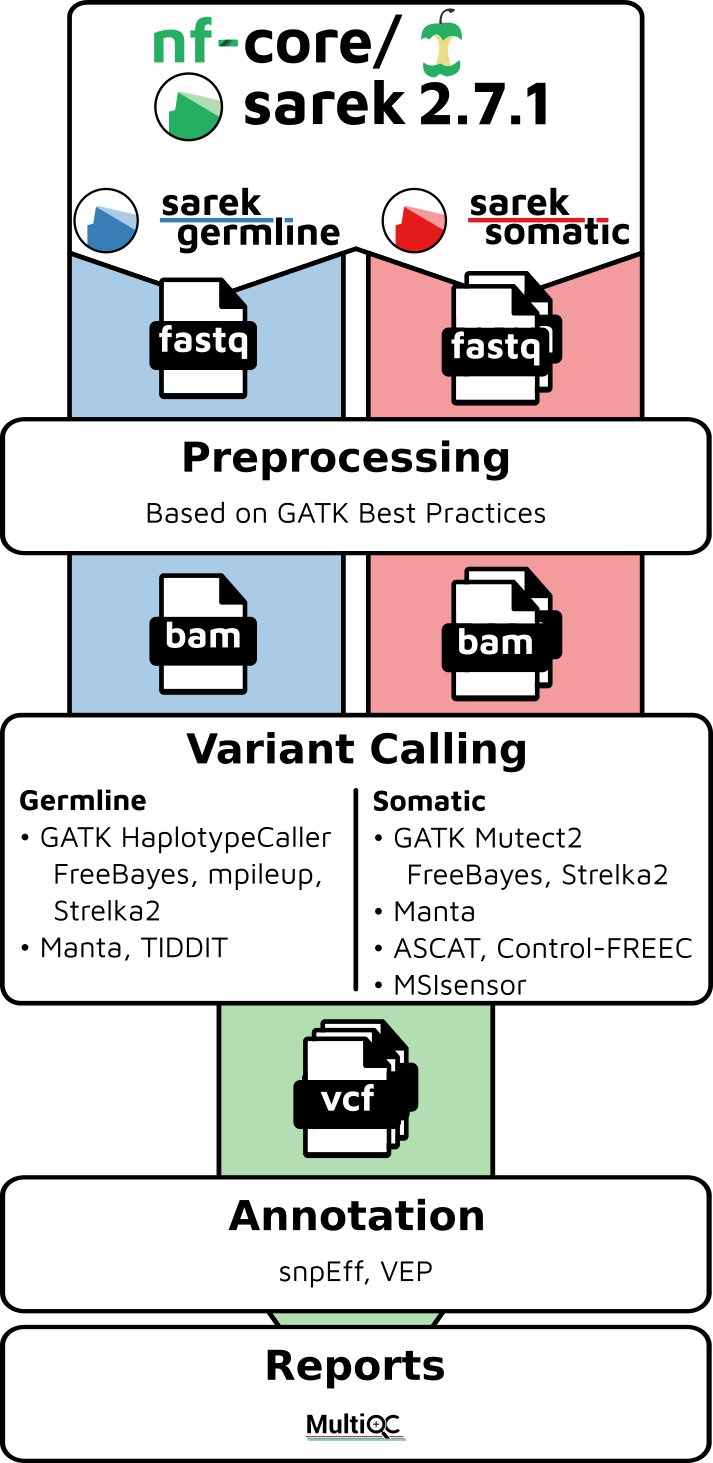An open-source analysis pipeline to detect germline or somatic variants from whole genome or targeted sequencing
Sarek is a workflow designed to detect variants on whole genome or targeted sequencing data. Initially designed for Human, and Mouse, it can work on any species with a reference genome. Sarek can also handle tumour / normal pairs and could include additional relapses.
The pipeline is built using Nextflow, a workflow tool to run tasks across multiple compute infrastructures in a very portable manner. It comes with Docker containers making installation trivial and results highly reproducible.
It's listed on Elixir - Tools and Data Services Registry and Dockstore.
-
Install
Nextflow(>=20.04.0) -
Install any of
Docker,Singularity,Podman,ShifterorCharliecloudfor full pipeline reproducibility (please only useCondaas a last resort; see docs) -
Download the pipeline and test it on a minimal dataset with a single command:
nextflow run nf-core/sarek -profile test,<docker/singularity/podman/shifter/charliecloud/conda/institute>
Please check nf-core/configs to see if a custom config file to run nf-core pipelines already exists for your Institute. If so, you can simply use
-profile <institute>in your command. This will enable eitherDockerorSingularityand set the appropriate execution settings for your local compute environment. -
Start running your own analysis!
nextflow run nf-core/sarek -profile <docker/singularity/podman/shifter/charliecloud/conda/institute> --input '*.tsv' --genome GRCh38
See usage docs for all of the available options when running the pipeline.
By default, the pipeline currently performs the following:
- Sequencing quality control (
FastQC) - Map Reads to Reference (
BWA mem) - Mark Duplicates (
GATK MarkDuplicatesSpark) - Base (Quality Score) Recalibration (
GATK BaseRecalibrator,GATK ApplyBQSR) - Preprocessing quality control (
samtools stats) - Preprocessing quality control (
Qualimap bamqc) - Overall pipeline run summaries (
MultiQC)
The nf-core/sarek pipeline comes with documentation about the pipeline: usage and output.
Sarek was developed at the National Genomics Infastructure and National Bioinformatics Infastructure Sweden which are both platforms at SciLifeLab, with the support of The Swedish Childhood Tumor Biobank (Barntumörbanken). QBiC later joined and helped with further development.
Main authors:
Helpful contributors:
- Adrian Lärkeryd
- Alexander Peltzer
- Chela James
- David Mas-Ponte
- Francesco L
- Harshil Patel
- James A. Fellows Yates
- Jesper Eisfeldt
- Johannes Alneberg
- José Fernández Navarro
- Lucia Conde
- Malin Larsson
- Marcel Martin
- Nilesh Tawari
- Olga Botvinnik
- Paul Cantalupo
- Phil Ewels
- Sabrina Krakau
- Sebastian-D
- Tobias Koch
- Winni Kretzschmar
- arontommi
- bjornnystedt
- cgpu
- gulfshores
- pallolason
- silviamorins
If you would like to contribute to this pipeline, please see the contributing guidelines.
For further information or help, don't hesitate to get in touch on the Slack #sarek channel (you can join with this invite), or contact us: Maxime Garcia, Szilvester Juhos
 |
 |
|---|---|
 |
 |
 |
If you use nf-core/sarek for your analysis, please cite the Sarek article as follows:
Garcia M, Juhos S, Larsson M et al. Sarek: A portable workflow for whole-genome sequencing analysis of germline and somatic variants [version 2; peer review: 2 approved] F1000Research 2020, 9:63 doi: 10.12688/f1000research.16665.2.
You can cite the sarek zenodo record for a specific version using the following doi: 10.5281/zenodo.3476426
In addition, references of tools and data used in this pipeline can be found in the CITATIONS.md file.
You can cite the nf-core publication as follows:
The nf-core framework for community-curated bioinformatics pipelines.
Philip Ewels, Alexander Peltzer, Sven Fillinger, Harshil Patel, Johannes Alneberg, Andreas Wilm, Maxime Ulysse Garcia, Paolo Di Tommaso & Sven Nahnsen.
Nat Biotechnol. 2020 Feb 13. doi: 10.1038/s41587-020-0439-x.







